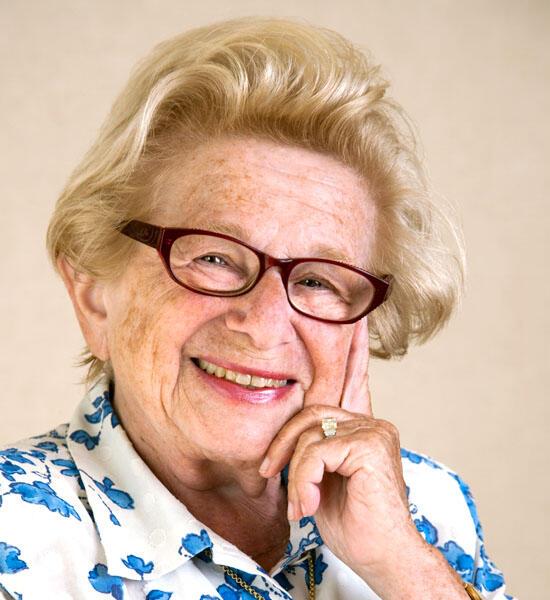The Radical Legacy of Dr. Ruth
One of the greatest advocates for sexual candor to ever live, Dr. Ruth Westheimer, died Friday, July 12, 2024, in her home in upper Manhattan. She was 96. “Dr. Ruth,” as she became known in the 1980s to legions of fans, had an astonishing career as a sex therapist unafraid to speak directly and explicitly about sex in all its varieties. Already in her 50s when a fifteen-minute spot on a local New York radio station launched her to fame, Westheimer became a ubiquitous figure on late-night talk shows, her own television programs, and the college campus lecture circuit. She wrote or co-wrote dozens of books.
Throughout all of this, Dr. Ruth extolled the importance of sexual pleasure. Young or old, she taught, everyone is entitled to joy. A CBS News Sunday Morning profile from 2002 featured footage of Westheimer encouraging lonely senior citizens to try vibrators and experience the solo pleasures of masturbation. Standing just four feet seven inches tall, with a thick German accent and grandmotherly appearance, Westheimer taught women about Kegel exercises, explained to shock jock Howard Stern that size really didn’t matter, and urged Arsenio Hall to say “vagina” on the air. “I did not know that my eventual contribution to the world would be to talk about orgasms and erections,” she told the Harvard Business Review in 2016, but it was a role she embraced. As a Holocaust survivor who lost her entire family when she was ten years old, she realized that her unique ability to talk to just about anyone about sex offered her a way to understand why she had survived. The name of one of her television shows, “Good Sex,” encapsulated her approach.
I’ve been thinking about Dr. Ruth a great deal over the last two weeks, reflecting on her legacy of teaching people about sexual pleasure. For me personally, Westheimer’s life is also a reminder of the deep historical connections between attitudes toward sexuality and broader rights and freedoms. As I researched my new book, Fierce Desires: A New History of Sex and Sexuality in America, I noted again and again not only how important erotic pleasure (and its pursuit) have been in people’s lives, but also the consequences of attempts to deny sexual joy. The first women’s rights groups in the United States coalesced in the nineteenth century in part to protect women from sexual violence or “ruin,” but a few voices also began to speak out in support of women’s right to not only safety, but also erotic gratification.
I began to think about sexual violence as, at least in part, the perpetrator’s assertion of his or her right to pleasure at the expense of another’s. This approach also helped me see the connections between bodily autonomy and pleasure in historical debates over contraception and abortion. Efforts to limit the freedoms of LGBTQIA+ people likewise impose one vision of sexual pleasure (usually, a vision of marital, heterosexual sex) on everyone, as if desire might be learned. Evangelical Christian marital advice guides of the 1970s and 1980s, something I wrote about years ago, now strike me even more overtly as attempts to confine the heights of sexual pleasure within a heterosexual marriage while restricting all other expressions of erotic joy. Movements against pornography, LGBTQIA+ rights, and bodily autonomy all align with that worldview.
As I note in my book’s introduction, it might seem axiomatic that sex is about pleasure; aside from reproduction, that would seem to be its main purpose. Yet Dr. Ruth’s ethos of candor and joy speaks to how historically powerful—and thus controversial—such seemingly obvious aspects of human sexuality have been in America’s past (and present). Educating people about their bodies and sexual functions helps them avoid sexually transmitted infections and unwanted pregnancies (the variety of sex ed I remember learning in high school), but it can also make it easier for people to seek out the erotic gratifications they desire. The history of sex and sexuality in America is replete with episodes of repression and censure. But from Dr. Ruth—and from iconoclastic sex educators, gender rebels, sex radicals, and others—we learn an alternative narrative of joyful candor. When we recognize how often that joy has been intentionally withheld and endangered, we begin to understand both the political nature of sexual pleasure and the radical legacy of Dr. Ruth.






